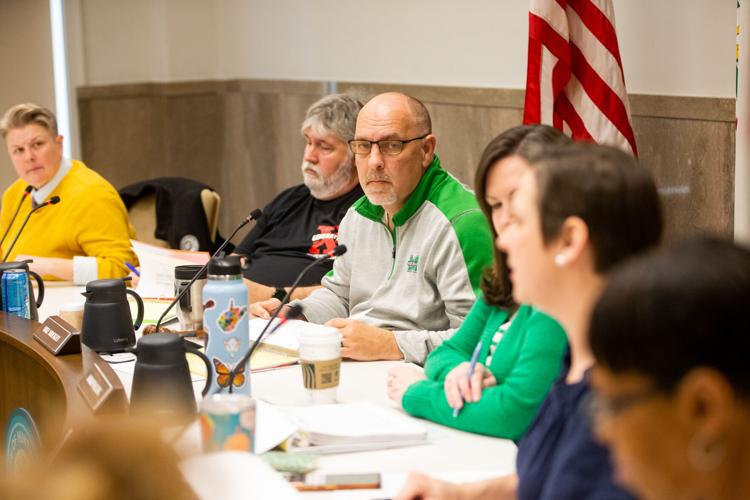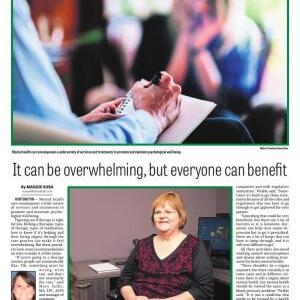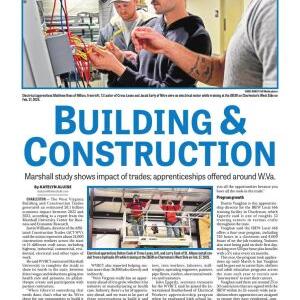HUNTINGTON �����Ƶ� The City of Huntington�����Ƶ�s microgrant program, which has allowed council members the ability to distribute money to a variety of charities of their choosing, will now be a part of the overall contributions from the city.
Mayor Patrick Farrell has taken steps in his proposed Fiscal Year 2026 budget to tighten city finances to adapt to a loss in federal funding the city has relied on in the past. The FY26 budget proposes a reduction in the city�����Ƶ�s contributions category, from $3.8 million to $2.8 million. Next year�����Ƶ�s contributions will all be spent on the city�����Ƶ�s priorities, Farrell said at Monday�����Ƶ�s regular City Council meeting.
The change will also eliminate the city council microgrant portion of the contribution line. While it did not come up in the original budget hearing, Farrell�����Ƶ�s plan is to make the microgrant program no longer specific to individual council districts.
�����Ƶ�What I didn�����Ƶ�t mention then, because I hadn�����Ƶ�t considered it, is that we are going to use the same process for the microgrant funds still budgeted for the remaining four months of this year,�����Ƶ� Farrell said. �����Ƶ�We are doing this because I want every dollar we spend to go through the same fair, open, and transparent process as all other city contributions. We are doing it now because I don�����Ƶ�t think we need to wait for the new fiscal year to practice fiscal transparency.
�����Ƶ�Our residents deserve a city that focuses its spending on what matters most to them and that is exactly what we are going to do,�����Ƶ� Farrell said.
Council members received the news of the change last week from Council Chairman Mike Shockley in an email. The email outlined a meeting between Farrell and Shockley where the decision was agreed upon by Shockley.
Huntington Communications Director Evan Lee said Friday that money from the microgrant fund will not be removed from the FY25 budget, so a budget revision would not be required; however, the application process will change.
How is the process changing?
In the original microgrant application process, councilmembers receive requests for funding and provide applications to the persons or groups requesting them, according to the city�����Ƶ�s website. Council members are expected to ensure applications are completed and then submit them to the city clerk�����Ƶ�s office, the website says. Council members would guide the organization in filling out the form. Once that requirement was fulfilled, council members could allocate funds to help bring the projects to life, Councilwoman At-Large Ally Layman said.
�����Ƶ�It would also give multiple council members the opportunity to also support different initiatives,�����Ƶ� Layman said.
Contributions will now come out of one citywide account and all applications will go through the finance department, Lee said.
New applications for funding must adhere to criteria that align with the �����Ƶ�city�����Ƶ�s goals�����Ƶ� of �����Ƶ�safer streets, better roads, and real economic growth�����Ƶ� to be accepted.
�����Ƶ�The micro-grant money will still get spent this year, but every dollar will now go through the same fair, open, and transparent process as all other contributions from the city,�����Ƶ� Farrell said in an email Friday. �����Ƶ�Any organization, including those supported by council members, can apply. Our residents deserve a city that focuses our spending on what matters most to them: safer streets, better roads, and real economic growth.�����Ƶ�
The former form required the organization to be a nonprofit. The new form does not share the same stipulation.
Councilwoman Holly Smith Mount, in a written statement last week, said she has two microgrant allocations pending for the Greater Huntington Park and Recreation District and Cabell County Public Library System. Both have been approved but await the organizations to fill out the forms for the requests.
The park funds are for its Easter events and the library allocation will be used for the Gallaher Village Library children�����Ƶ�s area, Mount said.
According to city budget records, the city council microgrants totaled $65,574 in FY24 and are budgeted for $66,000 in FY25, giving each council member $6,000 to give to nonprofits or community events. The microgrant funding of $66,000 makes up only 0.085% of the city�����Ƶ�s $78 million budget for FY25 and the flat FY26 budget.
Shockley said Monday nothing will change except for the mechanism of how people and organizations apply for microgrants. Instead of the funds being broken up by district, it will all be in one pot and councilmembers will still be able to apply and give feedback. The city�����Ƶ�s mayor has always had to approve the allocations, he said.
In the current fiscal year, $42,534 of microgrant funds have been spent, Lee said last week, and less than half of the council will be affected by the change, he said.
Some council members express concerns
Layman said in a written statement Monday that she had $1,200 in microgrant funds left for the current fiscal year, which she said she intended to allocate responsibly to benefit the community.
�����Ƶ�The microgrant funds were approved in last year�����Ƶ�s budget for council members to distribute directly to support community projects,�����Ƶ� Layman wrote. �����Ƶ�Without a budget revision or council vote, the Mayor and Council Chair made the decision behind closed doors to pull the remaining funds from council members and centralize control under the Mayor�����Ƶ�s office. That�����Ƶ�s not how the process is supposed to work, and it�����Ƶ�s a serious concern for accountability and transparency in our city government.�����Ƶ�
Lee did not directly address the concerns of some council members.
Acting City Attorney Scott Damron said he could not comment or give legal advice on whether the council would have to approve a budget revision for the microgrant change.
Because the funds will not be removed from the line items and the mayor is only changing the application process, the city charter does not address the current situation and if a budget revision would be needed.
Limits to funding
The new criteria outlined by the mayor focusing only on safer streets, better roads and economic growth is extremely limiting, Layman said.
Many of the microgrants council members have given in the past directly support community needs that may not fit those narrow categories, such as:
- Nonprofits providing food and supplies to families
- Youth sports programs
- Bus passes to the domestic violence shelter
- Neighborhood cleanups
- Arts and cultural events that bring the community together
�����Ƶ�If microgrants were truly about improving Huntington, we should trust council members to continue distributing them in ways that directly serve the people in their districts, not just in ways the Mayor alone deems acceptable,�����Ƶ� Layman said.
Layman said council microgrants are important because the council knows firsthand the needs of the neighborhoods they live in.
�����Ƶ�We as City Council members live in these neighborhoods, attend community meetings, and volunteer alongside residents. We see firsthand the needs in our districts and know where small investments can make a big impact,�����Ƶ� Layman said.
The microgrant program was funded as a line item in the Fiscal Year 2024-25 budget and approved by the council. Council member Sarah Walling said she has concerns that the microgrants will no longer be given solely based on what each member would choose to fund. Walling shared Layman�����Ƶ�s sentiment that council members should be involved in the microgrant award process.
�����Ƶ�Because we represent that neighborhood, we need to be able to support them,�����Ƶ� Walling said.
Walling also said she was concerned about the council not being invited to attend or contribute to the meeting between Farrell and Shockley. Walling said several council members were critical of being left out of the meeting.
The FY26 budget proposes the elimination of city council microgrants and a $766,000 decrease in contributions for economic development.
During a public hearing for the proposed budget, Farrell said he has revised the city�����Ƶ�s contribution request form and said everyone is welcome to fill it out and ask for help, but instead of spending money on contributions to outside agencies, the city�����Ƶ�s goal is to put it toward its future.
�����Ƶ�This isn�����Ƶ�t about politics, it�����Ƶ�s about making sure community-driven projects continue to get the support they need,�����Ƶ� Layman said. �����Ƶ�The decision to strip council members of this funding takes power away from the people and puts it behind closed doors, where only one office decides how money is spent. That�����Ƶ�s not how our local government should work.�����Ƶ�














